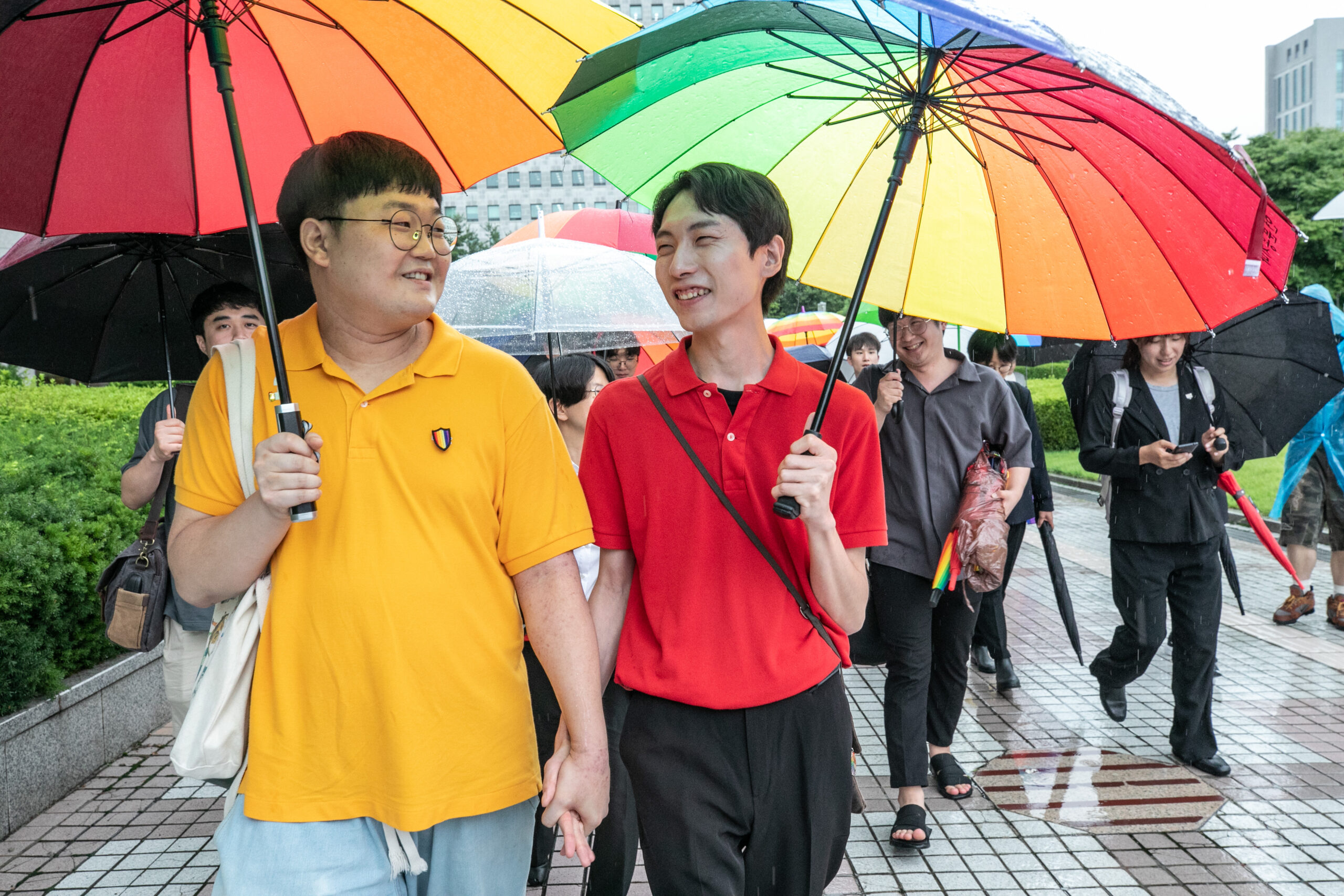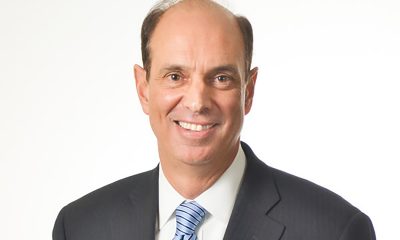World
Out in the World: LGBTQ news from Europe and Asia
The South Korean Supreme Court last week upheld health benefits for same-sex couples

SOUTH KOREA
The South Korean Supreme Court delivered a victory for same-sex couples last week, upholding a lower court ruling that found same-sex couples must be given equal access to benefits under the country’s National Health Insurance Service.
The ruling is a landmark as the first legal recognition of same-sex couples in the East Asian nation.
The Supreme Court ruled that the NHIS refusal to provide spousal benefits to same-sex couples was unconstitutional discrimination. The ruling is final.
The case was filed by a gay couple, So Seong-wook and Kim Yong-min, in 2021 after the NHIS revoked So’s registration as a dependent of Kim and imposed a new premium. So and Kim had been a couple since 2017 and had held a marriage ceremony in 2019.
The NHIS allows married or common-law heterosexual couples to register as dependents in employer-backed insurance but had no policy recognizing same-sex couples.
The Seoul Administrative Court ruled for the NHIS in 2022, but the following year that decision was overturned by the Seoul High Court, which ruled for the couple that the denial was discriminatory.
“When I listened to the verdict, I was so moved that I couldn’t hold back my tears,” So told reporters outside the court. “It took four years to earn this dependent status. We need to fight harder to legalize same-sex marriage going forward.”
The advocacy group Marriage for All Korea said in a statement that the decision was just a first step.
“This decision brings hope to other same-sex couples living in Korean society and is a huge milestone toward marriage equality and equal citizenship for LGBTQ people. However, same-sex couples who are not legally recognized in their marriage still experience various forms of discrimination,” the statement says.
“The lengthy and arduous lawsuits that same-sex couples must endure to gain single rights as a spouse, as seen in this case, should no longer be necessary. Fundamentally, we will continue to push for a broader marriage equality movement to eliminate all institutional discrimination that hinders same-sex couples from legally marrying and fully enjoying their rights as spouses, and for LGBTQ people in Korea to enjoy equal citizenship.”
Several bills to recognize same-sex marriage or civil unions and to ban discrimination against LGBTQ people have been introduced by opposition members in South Korea’s parliament over the years, but none has progressed.

LITHUANIA
A final attempt to pass a long-stalled civil union bill before the end of the current session of Parliament came to an anticlimactic end on July 18, as the government withdrew the bill from the agenda before the final day session began.
The civil union bill had long been a bone of contention in the fractious governing coalition whose largest party is the conservative Homeland Union and includes the more progressive Freedom Party, which had made the bill a priority.
The bill passed through two readings in parliament in part with the support of leftist opposition parties, but when the opposition withdrew their support of the bill — in part to deny the government a win on the issue — the coalition no longer had enough votes to get it passed, as a segment of the Homeland Union opposed it.
Over the past month, the Freedom Party had attempted to strong-arm the Homeland Union holdouts into supporting the bill, by threatening to block Lithuania’s appointment of a European commissioner unless the party supported the bill.
In the last few days of parliament’s session before the legislature is dissolved for October elections, it seemed that the parties had come to an agreement, and the civil union bill was going to be put on the agenda for a final vote on the final day of the session.
But the opposition Social Democrats refused to play ball, once again preferring to deny the government a victory on the file, even though the Social Democrats had campaigned on supporting civil unions in the past. Without their votes, the bill would be doomed to fail.
The government withdrew the bill from the agenda rather than allow it to fail. This will allow the bill to be brought back by the new parliament in October, rather than starting the process over again.
Despite the bill’s withdrawal, anti-LGBTQ protesters met outside the parliament and burned rainbow flags. Vilnius police said they are investigating potential charges of incitement to hatred.
The two-round parliamentary election is scheduled for Oct. 13 and Oct. 27, and polling shows the Social Democrats currently hold a wide lead.
Lithuania is one of only five European Union countries that do not recognize same-sex unions. The others are Romania, Bulgaria, Slovakia, and Poland, the latter of which has proposed a civil union bill that its government hopes to pass in the fall.
UNITED KINGDOM
The newly elected Labour government under Prime Minister Keir Starmer included a ban on conversion therapy in the King’s Speech that opened parliament on July 17, indicating that the bill will be a priority item during the session.
The King’s Speech is a tradition in UK politics, where the monarch reads a speech prepared by the government outlining its priorities for the upcoming session of parliament, usually lasting about a year.
During the election campaign, Starmer had pledged to back a transgender-inclusive ban on the abusive practice of conversion therapy, an issue which has become a political lightning rod in the UK over the past decade as a wave of anti-trans hysteria has gripped the media and much of the political class.
The previous Conservative government had pledged to ban conversion therapy six years ago but failed to bring a bill forward after floating the idea that the bill would allow conversion therapy for trans youth.
The UK LGBTQ advocacy group Stonewall praised the commitment to a conversion therapy ban in a statement.
“We welcome the new government’s commitment to banning conversion practices. Each day that these abusive practices remain legal, our communities are put at risk,” the statement says. “The government needs to urgently publish a comprehensive bill to ban these abhorrent practices once and for all.”
But the new government’s approach to trans issues is not entirely praiseworthy.
Two weeks ago, new Labour Secretary of State for Health Wes Streeting announced that his government was defending and extending a ban on puberty blockers for trans youth that was put in place by the Conservatives. That action has been denounced by trans activists and legal experts.
JAPAN
A trans woman is suing for the right to change her legal gender without first divorcing her wife, in a challenge to the nation’s laws surrounding both same-sex marriage and gender recognition.
The woman, who has not been identified, is in her 50s and has been in a long-term marriage to her wife, who is in her 40s, and neither partner wants to divorce. While she has legally changed her name to a woman’s name, her identification still lists her as “male,” which forces her to have uncomfortable conversations outing her trans status whenever she needs to show official documents.
Since 2003, it has been possible for trans people to update their legal gender in Japan, but only if they are unmarried. That essentially forces any married trans person to divorce their partner if they want to update their gender.
In 2010, the Japanese Supreme Court upheld the requirement that trans people be unmarried to update their legal gender, calling the situation “reasonable” and saying it did not violate the constitution.
But the woman’s lawyers believe the legal situation has changed.
Since 2021, several district courts across Japan have found that the ban on same-sex marriage is unconstitutional. While that has not yet legalized same-sex marriage, these cases will eventually be decided by the Supreme Court. If the court agrees with the lower courts that the ban on same-sex marriage is unconstitutional, then it should also find the divorce requirement for trans people to be unconstitutional.
Yoko Mizutani, one of the woman’s lawyers, says this case may also contribute to legalizing same-sex marriage.
“Many of those concerned have resigned to the notion that if same-sex marriages are not recognized, the unmarried requirement of the act will not change. If we win this petition, it could also help resolve the issue of same-sex marriage.”
SPAIN
The Constitutional Court has provisionally blocked an anti-LGBTQ law passed by the government of the Madrid Community that stripped a number of legal protections from LGBTQ people; citing constitutional, discriminatory, and jurisdictional issues.
Last year, the local government, which is led by the right-wing People’s Party and supported by the far-right Vox party, passed a bill that stripped legal recognition of trans youth, stopped allowing legal gender change without a medical diagnosis, allowed anti-LGBTQ discrimination and authorized conversion therapy.
Despite these legal protections being stripped at the local level, national laws still afforded LGBTQ people all of these rights and protections.
The national government, which is currently led by the left-wing People’s Socialist Party, filed for the injunction against the law, which it called unconstitutional, which the Constitutional Court has accepted.

More than 40 openly LGBTQ athletes are expected to compete in the Milan Cortina Winter Olympics that open on Friday.
Outsports.com notes eight Americans — including speedskater Conor McDermott-Mostowy and figure skater Amber Glenn — are among the 44 openly LGBTQ athletes who will compete in the games. The LGBTQ sports website also reports Ellis Lundholm, a mogul skier from Sweden, is the first openly transgender athlete to compete in any Winter Olympics.
“I’ve always been physically capable. That was never a question,” Glenn told Outsports.com. “It was always a mental and competence problem. It was internal battles for so long: when to lean into my strengths and when to work on my weaknesses, when to finally let myself portray the way I am off the ice on the ice. That really started when I came out publicly.”
McDermott-Mostowy is among the six athletes who have benefitted from the Out Athlete Fund, a group that has paid for their Olympics-related training and travel. The other beneficiaries are freestyle skier Gus Kenworthy, speed skater Brittany Bowe, snowboarder Maddy Schaffrick, alpine skier Breezy Johnson, and Paralympic Nordic skier Jake Adicoff.
Out Athlete Fund and Pride House Los Angeles – West Hollywood on Friday will host a free watch party for the opening ceremony.
“When athletes feel seen and accepted, they’re free to focus on their performance, not on hiding who they are,” Haley Caruso, vice president of the Out Athlete Fund’s board of directors, told the Los Angeles Blade.
Four Italian LGBTQ advocacy groups — Arcigay, CIG Arcigay Milano, Milano Pride, and Pride Sport Milano — have organized the games’ Pride House that will be located at the MEET Digital Culture Center in Milan.
Pride House on its website notes it will “host a diverse calendar of events and activities curated by associations, activists, and cultural organizations that share the values of Pride” during the games. These include an opening ceremony party at which Checcoro, Milan’s first LGBTQ chorus, will perform.
ILGA World, which is partnering with Pride House, is the co-sponsor of a Feb. 21 event that will focus on LGBTQ-inclusion in sports. Valentina Petrillo, a trans Paralympian, is among those will participate in a discussion that Simone Alliva, a journalist who writes for the Italian newspaper Domani, will moderate.
“The event explores inclusivity in sport — including amateur levels — with a focus on transgender people, highlighting the role of civil society, lived experiences, and the voices of athletes,” says Milano Pride on its website.
The games will take place against the backdrop of the U.S. Olympic and Paralympic Committee’s decision to ban trans women from competing in women’s sporting events.
President Donald Trump last February issued an executive order that bans trans women and girls from female sports teams in the U.S. A group of Republican lawmakers in response to the directive demanded the International Olympics Committee ban trans athletes from women’s athletic competitions.
The IOC in 2021 adopted its “Framework on Fairness, Inclusion and Nondiscrimination on the Basis of Gender Identity and Sex Variations” that includes the following provisions:
• 3.1 Eligibility criteria should be established and implemented fairly and in a manner that does not systematically exclude athletes from competition based upon their gender identity, physical appearance and/or sex variations.
• 3.2 Provided they meet eligibility criteria that are consistent with principle 4 (“Fairness”, athletes should be allowed to compete in the category that best aligns with their self-determined gender identity.
• 3.3 Criteria to determine disproportionate competitive advantage may, at times, require testing of an athlete’s performance and physical capacity. However, no athlete should be subject to targeted testing because of, or aimed at determining, their sex, gender identity and/or sex variations.
The 2034 Winter Olympics are scheduled to take place in Salt Lake City. The 2028 Summer Olympics will occur in Los Angeles.
China
Two Chinese men detained over AI-generated picture of pandas engaging in same-sex behavior
Arrests part of increased online surveillance, LGBTQ rights crackdown

Chinese authorities have detained two men after they shared an artificially altered image that linked queer identity with a specific city.
The Washington Post on Jan. 21 reported the men — who are 29 and 33 — circulated an AI-generated picture depicting pandas engaging in same-sex behavior in Chengdu, a major city in southwestern China often referred to as the “panda capital” due to its association with giant panda conservation. Local officials described the sharing of the image as “malicious,” and police in Chengdu took the men into custody.
Authorities also suspended the two men’s social media accounts, accusing them of spreading misinformation presented as legitimate news. According to the Post, the artificially generated image was posted alongside a fabricated headline, giving the appearance of an authentic news report. The image depicted two male pandas mating.
According to an official police report, police said the fabricated image was presented in the format of a legitimate news article and accompanied by a false headline. The caption read, “Chengdu: Two male Sichuan giant pandas successfully mate for the first time without human intervention,” authorities said.
Chinese regulators have in recent years tightened oversight of AI and online content.
Under the Interim Measures for the Administration of Generative Artificial Intelligence Services, issued in 2023, providers and users of generative AI systems are required to comply with existing laws, adhere to social and ethical standards, and refrain from producing or disseminating false or misleading information. Additional rules that took effect on Sept. 1, 2025, require online platforms to clearly label AI-generated content, a measure authorities have said is intended to curb misinformation and maintain order in digital spaces.
Police under Chinese law are permitted to impose administrative detention of up to 15 days for offenses deemed to disrupt public order, a category that includes the fabrication or dissemination of false information online. Such cases are handled outside the criminal court system and do not require formal prosecution.
According to a statement the Chengdu Public Security Bureau’s Chenghua branch released, police opened an investigation after receiving public reports that online accounts were spreading false information about the city. Authorities said officers collected evidence shortly afterward and placed the two individuals under administrative detention.
The detentions are not an isolated case.
The Washington Blade in July 2025 reported a Chinese female writer was arrested and subjected to a strip search after publishing gay erotic fiction online. At least 30 other writers — most of them women in their 20s — in the months that followed publicly described similar encounters with law enforcement, including home raids and questioning related to their online writing.
ShanghaiPRIDE, a Chinese LGBTQ advocacy group that organized annual Pride events in the city, has remained indefinitely suspended since 2021. In the same period, dozens of LGBTQ-focused accounts have been removed from WeChat, China’s largest social media platform, as authorities intensified oversight of online content related to sexual orientation and gender identity.
Authorities in 2021 detained the founder of LGBT Rights Advocacy China. They later released them on the condition that he shut down the organization, which ceased operations shortly afterward.
China decriminalized homosexuality in 1997 when it removed consensual same-sex sexual relations from the country’s criminal code. The Chinese Society of Psychiatry in 2001 formally removed homosexuality from its list of mental disorders. Despite those changes, same-sex relationships remain unrecognized under Chinese law, and there are no legal protections against discrimination based on sexual orientation or gender identity. Public advocacy for LGBTQ rights remains tightly restricted, with authorities continuing to limit community organizing, public events and online expression related to sexual minority issues.
Within China’s LGBTQ community, transgender and gender non-conforming people remain among the most vulnerable. Under current regulations, access to gender-affirming surgery is subject to strict requirements, including being at least 18 years old, unmarried, obtaining parental consent and having no criminal record — procedures that are required in order to legally change one’s gender on official documents.
China’s system of online governance places responsibility on both users and platforms to prevent the spread of prohibited content. Social media companies are required to conduct real-name verification, monitor user activity and remove posts that violate regulations, while individuals can be punished for content authorities determine to have caused public misunderstanding or social disruption.
“Actually, at least three similar incidents have occurred in Chengdu recently, all involving netizens posting on social media linking Chengdu with homosexuality, resulting in legal repercussions. This isn’t just about giant pandas. I think the local police’s reaction was somewhat excessive,” said Renn Hao, a Chinese queer activist. “The content was actually praising Chengdu’s inclusivity, and there was no need to punish them with regulations like ‘maliciously spreading false information.’”
“This situation reflects the strict censorship of LGBT related content in the area,” they added. “This censorship makes LGBT-related content increasingly invisible, and people are even more afraid to post or mention it. This not only impacts the LGBTQ+ community in China but also hinders public understanding and awareness of this group.”

Advocacy groups are demanding the Trump-Vance administration not to deport two gay men to Iran.
MS Now on Jan. 23 reported the two men are among the 40 Iranian nationals who the White House plans to deport.
Iran is among the countries in which consensual same-sex sexual relations remain punishable by death.
The Washington Blade earlier this month reported LGBTQ Iranians have joined anti-government protests that broke out across the country on Dec. 28. Human rights groups say the Iranian government has killed thousands of people since the demonstrations began.
Rebekah Wolf of the American Immigration Council, which represents the two men, told MS Now her clients were scheduled to be on a deportation flight on Jan. 25. A Human Rights Campaign spokesperson on Tuesday told the Blade that one of the men “was able to obtain a temporary stay of removal from the” 10th U.S. Circuit Court of Appeals, and the other “is facing delayed deportation as the result of a measles outbreak at the facility where they’re being held.”
“My (organization, the American Immigration Council) represents those two gay men,” said American Immigration Council Senior Fellow Aaron Reichlin-Melnick in a Jan. 23 post on his Bluesky account. “They had been arrested on charges of sodomy by Iranian moral police, and fled the country seeking asylum. They face the death penalty if returned, yet the Trump (administration) denied their asylum claims in a kangaroo court process.”
“They are terrified,” added Reichlin-Melnick.
My org @immcouncil.org represents those two gay men. They had been arrested on charges of sodomy by Iranian moral police, and fled the country seeking asylum. They face the death penalty if returned, yet the Trump admin denied their asylum claims in a kangaroo court process.
They are terrified.
— Aaron Reichlin-Melnick (@reichlinmelnick.bsky.social) January 23, 2026 at 8:26 AM
Reichlin-Melnick in a second Bluesky post said “deporting people to Iran right now, as body bags line the street, is an immoral, inhumane, and unjust act.”
“That ICE is still considering carrying out the flight this weekend is a sign of an agency and an administration totally divorced from basic human rights,” he added.
Deporting people to Iran right now, as body bags line the street, is an immoral, inhumane, and unjust act. That ICE is still considering carrying out the flight this weekend is a sign of an agency and an administration totally divorced from basic human rights. www.ms.now/news/trump-d…
— Aaron Reichlin-Melnick (@reichlinmelnick.bsky.social) January 23, 2026 at 8:27 AM
HRC Vice President of Government Affairs David Stacy in a statement to the Blade noted Iran “is one of 12 nations that still execute queer people, and we continue to fear for their safety.” Stacy also referenced Renee Good, a 37-year-old lesbian woman who a U.S. Immigration and Customs Enforcement agent shot and killed in Minneapolis on Jan. 7, and Andry Hernández Romero, a gay Venezuelan asylum seeker who the Trump-Vance administration “forcibly disappeared” to El Salvador last year.
“This out-of-control administration continues to target immigrants and terrorize our communities,” said Stacy. “That same cruelty murdered Renee Nicole Good and imprisoned Andry Hernández Romero. We stand with the American Immigration Council and demand that these men receive the due process they deserve. Congress must refuse to fund this outrage and stand against the administration’s shameless dismissal of our constitutional rights.”




















